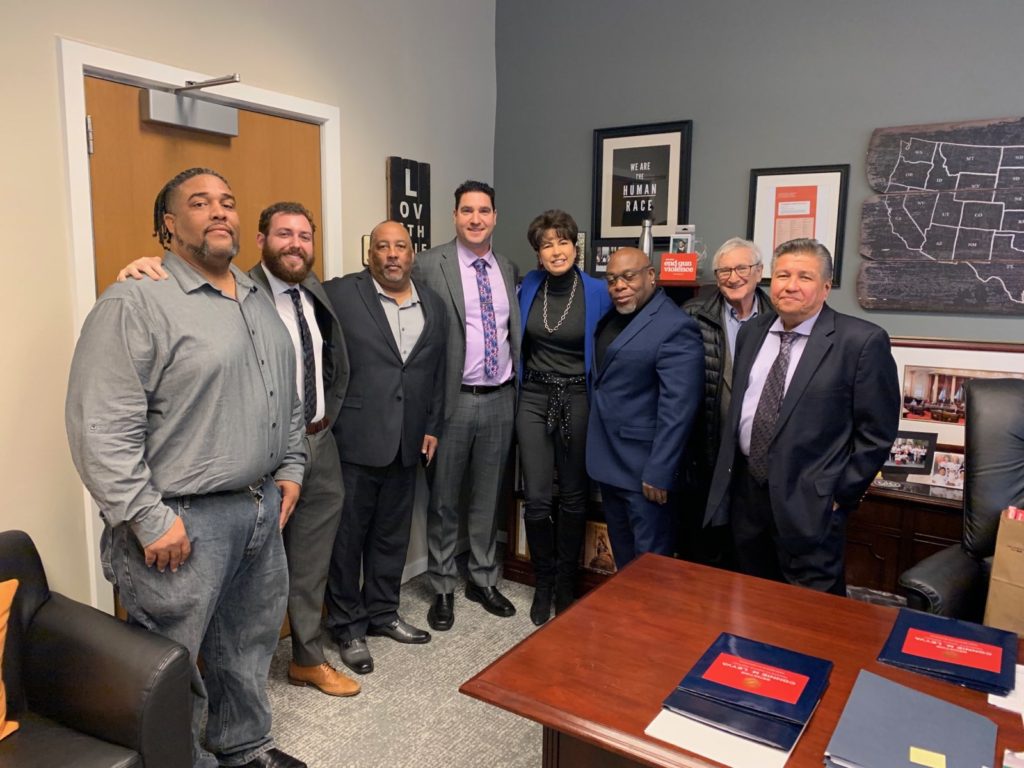When a contractor installing solar power in Murrieta, CA hit a SoCalGas line last July, the resulting explosion killed Local 132 member Wade Kilpatrick, injured several others and leveled a house. Kilpatrick died because the contractor failed to call 811 to check for gas lines prior to digging.

Safety, reliability, sustainability
All of this could have been avoided if the contractor followed safety rules. Unfortunately, in California, there is little penalty for breaking the rules.
That’s about to change. The presidents of UWUA Locals 132, 483 and 522 at the gas company are preparing to submit the Wade Kilpatrick Gas Safety and Workforce Adequacy Act of 2020 in Sacramento. Always putting safety first, this legislation, if passed, will be model legislation as the UWUA battles irresponsible contractors that endanger lives, while simultaneously promoting union jobs and a safe environment.
“The Kilpatrick Act is intended to fully utilize our members who provide essential services, especially natural gas, to the people of California,” says Local 132 President Eric Hofmann. “The marginalization of workers by deregulation and the single-minded pursuit of profit by the utilities and the Public Utility Commission of previous administrations are major reasons for the struggles we presently have around safety, reliability and adequacy of service and responsiveness to the challenges of climate change.”
UWUA friend, State Senator Maria Elena Durazo, is the bill’s sponsor in the Senate and Tyler Diep is its sponsor in the Assembly.
The Wade Kilpatrick Gas Safety and Workforce Adequacy Act of 2020 is built around three pillars:
Greater emphasis on 811 Dig Alert.
The legislation would penalize rogue or cowboy contractors who repeatedly damage gas infrastructure by not calling 811. This damage puts members in danger as first responders and releases harmful methane to the atmosphere.
The need for a well-trained workforce.
To reduce leaks to an absolute minimum and provide timely, responsive gas service, staffing levels must be adequate. Although state law already requires this, the California Public Utilities Commission (CPUC) must implement the requirement. The bill would establish a safety culture in the industry that includes robust ongoing participation of workers in safety planning, implementation and enforcement at the utilities and at the CPUC. It also supports workforce training programs to assure that the knowledge and experience of the existing workforce is passed on to utility workers of the future.
Finding and repairing gas leaks.
Gas leaks, especially Grade 3 leaks, while being deemed not hazardous to the public in terms of an immediate probability of explosion, do enormous damage to the environment because of the potency of methane as a greenhouse gas. In terms of achieving California’s ambitious climate goals, utility workers must be empowered to find and fix leaks. This would significantly reduce the amount of methane released into the atmosphere.
Whatever role natural gas will play in the long term, it remains an essential fuel now and for some time into the future. While it remains a part of California’s fuel mix it should be delivered by an energy delivery system that is safe, tight, leak-less and well maintained. In order to achieve that, utility workers must be fully supported and empowered to do their jobs. That is the thrust of the Wade Kilpatrick Safety and Workforce Adequacy Act of 2020.

